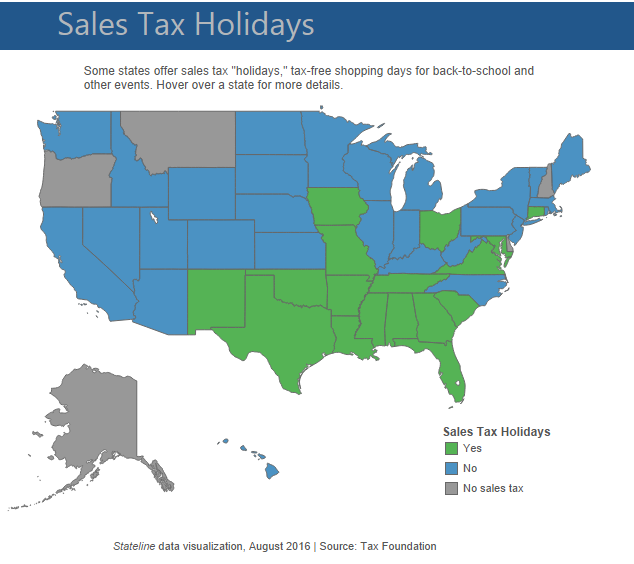Connecting state and local government leaders
While retailers have persuaded legislators that the feel-good tax breaks are good for the economy, studies have shown otherwise.
This article was originally published by Stateline, an initiative of The Pew Charitable Trusts, and was written by Elaine S. Povich.
Many back-to-school shoppers used to be able to count on sales tax holidays at this time of year. But more states are disappointing them by rejecting or cutting back on the small tax breaks, as they seek more and steadier revenue to keep budgets balanced.
Massachusetts lawmakers this year decided not to give shoppers a late summer holiday from having to pay the state’s 6.25 percent sales tax on items with a price tag under $2,500—as it had in recent years. Legislators did so in the face of a budget deficit that has been projected to be as high as $1 billion.
Florida legislators trimmed the state’s back-to-school tax holiday this year from 10 days to three and limited the tax break to purchases of clothing under $60 and school supplies under $15. Louisiana trimmed shoppers’ holiday savings by saying they had to pay 3 percent on their purchases this year instead of giving them the full 5 percent break.
Efforts to revive North Carolina’s holiday, which was scrapped two years ago, failed this year. And legislators in Kansas, Maine, Nebraska, Rhode Island and Wisconsin have rejected proposals for new back-to-school tax holidays.
The backpedaling reverses a trend of providing tax-free shopping days that dates to 1980, when Ohio and Michigan eliminated the sales tax on automobiles as a way to boost sales during a recession and get people to buy American cars, many of which were produced in those states.
At one time or another, about 20 states, mostly in the South, have experimented with granting holidays, with a peak of 19 states in 2010.

Traditionally, states’ sales tax holidays tend to coincide with the start of the new school year. But some states have lifted taxes on items far beyond backpacks and notebooks.
Several states, including Maryland, Missouri and Virginia, have separate holidays for energy-efficient appliance purchases.
Others, including Louisiana and Mississippi, have holidays for firearms and hunting supplies.
States in the Southeast also have had holidays before hurricane season begins in June on purchases of emergency supplies.
Retailers love sales tax holidays, because they come with built-in advertising campaigns to encourage shoppers to turn out and spend.
But while retailers have persuaded legislators that the feel-good tax breaks are good for the economy, studies have shown otherwise.
States bordering other states with tax holidays see their own as a way to stem the flow of consumers across state lines.
And lawmakers love a tax cut, especially when short-lived.
Florida, which has no state income tax and relies more heavily on the sales tax than many other states, has found tax holidays to be a way of giving its taxpayers a break while other states are cutting income taxes.
But Scott Drenkard of the nonpartisan Tax Foundation says the holidays are nothing but “gimmicks.”
“Policymakers are telling their taxpayers, ‘We did something for you this weekend.’ It’s politically expedient, but poor tax policy.”
If governors and legislatures really want to make a difference for taxpayers, Drenkard said, they should implement “365-days-a-year” tax changes.
The Tax Foundation and other opponents say the holidays don’t help retailers because buyers simply “shift” purchases they were going to make any way.
They don’t help lower-income people much either, according to the left-leaning Institute on Taxation and Economic Policy (ITEP).
“Wealthier taxpayers are often best-positioned to benefit from the holidays since they have more flexibility to shift the timing of their purchases to take advantage of the tax break—an option that isn’t available to families living paycheck to paycheck,” the ITEP said in a policy paper last month.
'Absolutely Vital'
The holidays do cost state and local treasuries money—more than $300 million this year, the ITEP estimates.
Cost is what prompted Massachusetts to not renew its weekend-long holiday this year. In June, the state’s budget office announced tax revenue was coming in as much as $750 million short. Later estimates put the budget gap at nearly $1 billion. Legislators said the holiday’s $25 million price tag was too high this year.
Republican Gov. Charlie Baker had supported the holiday in the past. This year’s tight budget made it tough to both have the holiday and increase funding for his priorities — such as education, helping local governments and fighting the opioid epidemic—his press secretary, Billy Pittman, said.
This is the first year since Massachusetts started having a back-to-school holiday, in 2004, that it hasn’t had one, other than 2009, during the recession.
Not everyone is happy about it. Jon Hurst, president of the Massachusetts Retailers Association, said the need for the tax holiday is greater than ever, for two reasons: because consumers can cross the border to sales-tax-free New Hampshire, and because “savvy consumers” can try to avoid the sales tax by shopping on the internet.
“No consumer in Massachusetts is farther than an hour’s drive to New Hampshire to buy things tax-free,” Hurst said. “The sales tax holiday is absolutely vital in Massachusetts.”
In some Massachusetts cities, like Pittsfield, retailers have advertised that they would pay the sales tax for customers on a given weekend, to make up for the lost holiday.
But efforts like that don’t deliver the same results as the state declaring a holiday, Hurst said, adding that the holiday can put shoppers in a buying mood, so that they often buy more than just the goods that are tax-exempt.
The state also benefits from the income tax on workers putting in double and triple shifts, Hurst said.
Hurst predicted fewer sales—not only of tax-free items but also of impulse buys—resulting in a decrease in state sales tax revenue.
Cutting Back
Rather than scrap their holidays, Louisiana and Florida chose to cut back on them.
In the face of a $2 billion budget shortfall, Louisiana decided to levy a reduced 3 percent tax during its hunting equipment holiday next month rather than exempt it entirely from the state’s 5 percent sales tax, just as it did on school supplies last month. It also eliminated the state holiday for goods purchased to prepare for hurricanes.
The reduced tax rate for school supplies and hunting equipment applies to items up to $2,500. Two big-ticket items for $2,500 each would qualify, according to the Louisiana Department of Revenue. But one purchase for more than $2,500 would not.
Florida’s shortened back-to-school holiday this year will still cost the state about $26 million in sales tax revenue, according to a legislative analysis. But having its normal 10-day holiday instead of the three-day break would have cost another $20 million. The disparity? Most of the holiday shopping is done on the weekend.
One fan of tax cuts who is not a fan of the holidays is Republican state Sen. Tom Lee, who chairs the Senate Appropriations Committee. He prefers giving Floridians cuts in other taxes, as the Legislature did this year.
Lawmakers lowered the property tax and a tax on manufacturers. Both cuts were sought by Republican Gov. Rick Scott.
“I think the tax-free holiday makes great politics and lousy economics,” Lee said. “They are wildly popular, but they cannibalize on spending decisions that would have been made anyway.”

NEXT STORY: Pennsylvania, Illinois Budget Fights Hold Lessons for Other States



